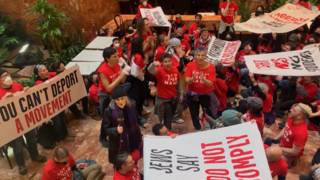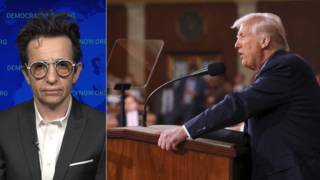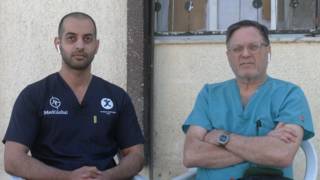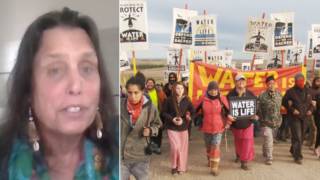
Bill McKibben, co-founder of 350.org and a lead organizer behind Sunday’s People’s Climate March and global day of action, joins us to reflect on the historic protest. “There hasn’t been a political gathering about anything this large in this country for many years,” McKibben says. “And I think what it demonstrates is that climate change is at the absolute tip now of people’s consciousness.”
Transcript
AMY GOODMAN: But right now, to lay out the scope of what’s taking place today in this historic moment is Bill McKibben, the founder of 350.org, one of the organizations that has organized this mass march today. Bill McKibben, welcome to Democracy Now!
BILL McKIBBEN: Amy, thank you so much for being here and for documenting what’s going to be a pretty remarkable day. I think what you said was right. There hasn’t been a political gathering about anything that’s this large in this country for many years. And I think what it demonstrates is climate change is at the absolute tip now of people’s consciousness.
AMY GOODMAN: I also wanted to ask you about this announcement that Mayor de Blasio, the new mayor of New York, has made around New York City’s commitment to dealing with climate change and how significant it is. It’s today on the front page of The New York Times. Maybe someone’s got that paper. I think I see it right over there. I’m going to see if I can get a copy. It says, “In a sweeping effort to reduce its environmental impact, New York City is planning to overhaul the energy-efficiency standards of all its public buildings and to pressure private landlords to make similar improvements.”
Now, it’s a pretty interesting number. “The initiative is part of a pledge, to be announced before … the [U.N.] Climate Summit … Tuesday, to decrease greenhouse gas emissions by 80 percent by 2050 from 2005 levels. The [U.N.] has pointed to that rate of decrease as a desired target for developed countries to mitigate the effects of climate change.” And the significance is New York would become the largest city in the world to make the commitment, according to Mayor de Blasio.
BILL McKIBBEN: It strikes me that we should have marched a long time ago. This is a good sign about what happens when people get together and ask for things. And, you know, it’s a good thing to have a mayor like de Blasio who takes that seriously and goes to work on it, and I’m really glad to hear it. The real point of this is that we—if we assemble enough people and enough movement, then we can match the money that the fossil fuel industry has. That’s all they have. They lost the argument 20 years ago about climate change, but they’ve won the fight because they have all the money. We don’t have money, so we better assemble what we do have, which is warm bodies. And there’s a lot of them out here today.
AMY GOODMAN: You said the Koch brothers, together, are the richest person on Earth?
BILL McKIBBEN: They’re the richest person on Earth. And not only that, they are more than willing to spend some percentage of that wealth making sure that nothing ever changes. There was one study that said that if the Keystone pipeline got built, they’d make another $100 billion, the two of them.
AMY GOODMAN: You’re from Vermont, Bill.
BILL McKIBBEN: Yes.
AMY GOODMAN: We have just talked to Senator Sanders, who may run for president. But you also come from a state where there will be scores of buses that are coming here.
BILL McKIBBEN: Yes. No, we heard there’s more than a thousand Vermonters heading down. I heard there were 23 buses, and we’re hearing people filled the trains and everything else. Vermont’s definitely in the house. But there’s—you know, the Climate Train arrived from California yesterday full of people. There are buses coming from Wisconsin and Minnesota. And, I mean, it’s going to be mildly chaotic here on Central Park West for an hour or two, so people just got to be calm and cool and collected. But if you’re listening to this anywhere near New York, you should be here, because this is history today.
AMY GOODMAN: Now, the Vermont governor, Shumlin, has just said he may consider divesting the state from fossil fuels. It’s something you have been demanding.
BILL McKIBBEN: Absolutely. And, you know, we’ve got universities and pension funds, but Vermont Governor Shumlin is the first governor to say he’s going to divest his state from fossil fuels.
AMY GOODMAN: What does that mean?
BILL McKIBBEN: That would be a very big boost to what’s already the fastest-growing divestment movement ever. States and universities and churches should not be invested in companies that are wrecking the planet. It’s financially unwise, because if we ever do anything about climate, they’ll be out of luck, but it’s morally impossible. You can’t complain about the fact that Hurricane Irene is wrecking Vermont if you’re also investing in the companies that are bringing you Hurricane Irene.












Media Options